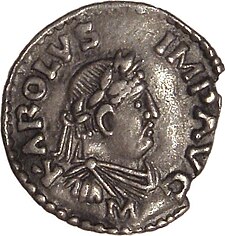
Back Karel die Grote Afrikaans Karl der Große ALS ካሮሉስ ማግኑስ Amharic Carlos Magno AN Carl Micela Francena Cyning ANG शार्लेमन्य ANP شارلمان Arabic شارلمان ARZ Carlomagno AST Charles I (gazik ke Franca) AVK
| Charlemagne | |
|---|---|
 A denarius of Charlemagne dated c. 812–814 with the inscription KAROLVS IMP AVG (Karolus Imperator Augustus) | |
| King of the Franks | |
| Reign | 9 October 768 – 28 January 814 |
| Coronation | 9 October 768 Noyon |
| Predecessor | Pepin the Short |
| Successor | Louis the Pious |
| Co-ruler | Carloman I (768–771) Charles (800–811) |
| King of the Lombards (Italy) | |
| Reign | June 774 – 28 January 814 |
| Predecessor | Desiderius |
| Successor | Bernard |
| Co-ruler | Pepin of Italy (781–810) |
| Emperor of the Carolingian Empire | |
| Reign | 25 December 800 – 28 January 814 |
| Coronation | 25 December 800 Old St. Peter's Basilica, Rome |
| Successor | Louis the Pious |
| Born | 2 April 748[a] Francia |
| Died | 28 January 814 Aachen, Francia |
| Burial | |
| Spouses |
|
| Issue Among others | |
| Dynasty | Carolingian |
| Father | Pepin the Short |
| Mother | Bertrada of Laon |
| Religion | Chalcedonian Christianity |
| Signum manus | |
| Carolingian dynasty |
|---|
 |
Charlemagne (/ˈʃɑːrləmeɪn/ SHAR-lə-mayn; 2 April 748[a] – 28 January 814) was King of the Franks from 768, King of the Lombards from 774, and Emperor of what is now known as the Carolingian Empire from 800, holding these titles until his death in 814. He united most of Western and Central Europe, and was the first recognised emperor to rule from the west after the fall of the Western Roman Empire approximately three centuries earlier. Charlemagne's reign was marked by political and social changes that had lasting influence on Europe throughout the Middle Ages.
A member of the Frankish Carolingian dynasty, Charlemagne was the eldest son of Pepin the Short and Bertrada of Laon. With his brother, Carloman I, he became king of the Franks in 768 following Pepin's death and became the sole ruler three years later. Charlemagne continued his father's policy of protecting the papacy and became its chief defender, removing the Lombards from power in northern Italy in 774. His reign saw a period of expansion that led to the conquests of Bavaria, Saxony, and northern Spain, as well as other campaigns that led Charlemagne to extend his rule over a large part of Europe. Charlemagne spread Christianity to his new conquests (often by force), as seen at the Massacre of Verden against the Saxons. He also sent envoys and initiated diplomatic contact with the Abbasid caliph Harun al-Rashid in the 790s, due to their mutual interest in Iberian affairs.
In 800, Charlemagne was crowned emperor in Rome by Pope Leo III. Although historians debate the coronation's significance, the title represented the height of his prestige and authority. Charlemagne's position as the first emperor in the West in over 300 years brought him into conflict with the Eastern Roman Empire in Constantinople. Through his assumption of the imperial title, he is considered the forerunner to the line of Holy Roman Emperors, which persisted into the nineteenth century. As king and emperor, Charlemagne engaged in a number of reforms in administration, law, education, military organisation, and religion, which shaped Europe for centuries. The stability of his reign began a period of cultural activity known as the Carolingian Renaissance.
Charlemagne died in 814 and was laid to rest at Aachen Cathedral in Aachen, his imperial capital city. He was succeeded by his only surviving legitimate son, Louis the Pious. After Louis, the Frankish kingdom was divided and eventually coalesced into West and East Francia, which later became France and Germany, respectively. Charlemagne's profound influence on the Middle Ages and influence on the territory he ruled has led him to be called the "Father of Europe" by many historians. He is seen as a founding figure by multiple European states and a number of historical royal houses of Europe trace their lineage back to him. Charlemagne has been the subject of artworks, monuments and literature during and after the medieval period and is venerated by the Catholic Church.
Cite error: There are <ref group=lower-alpha> tags or {{efn}} templates on this page, but the references will not show without a {{reflist|group=lower-alpha}} template or {{notelist}} template (see the help page).